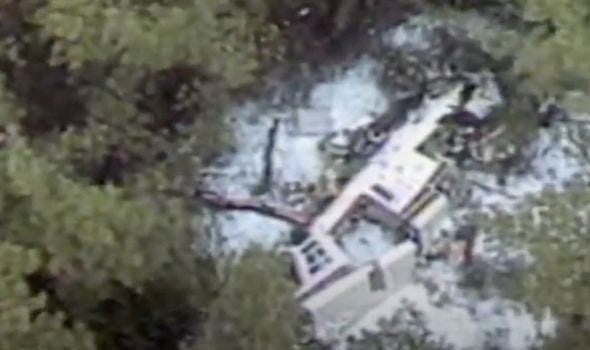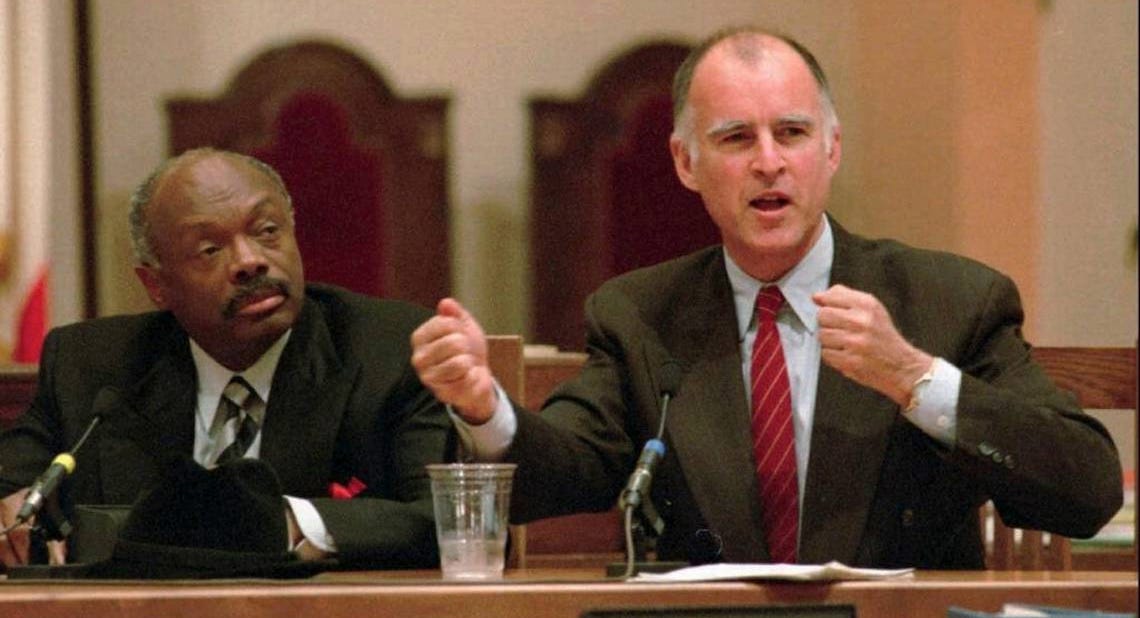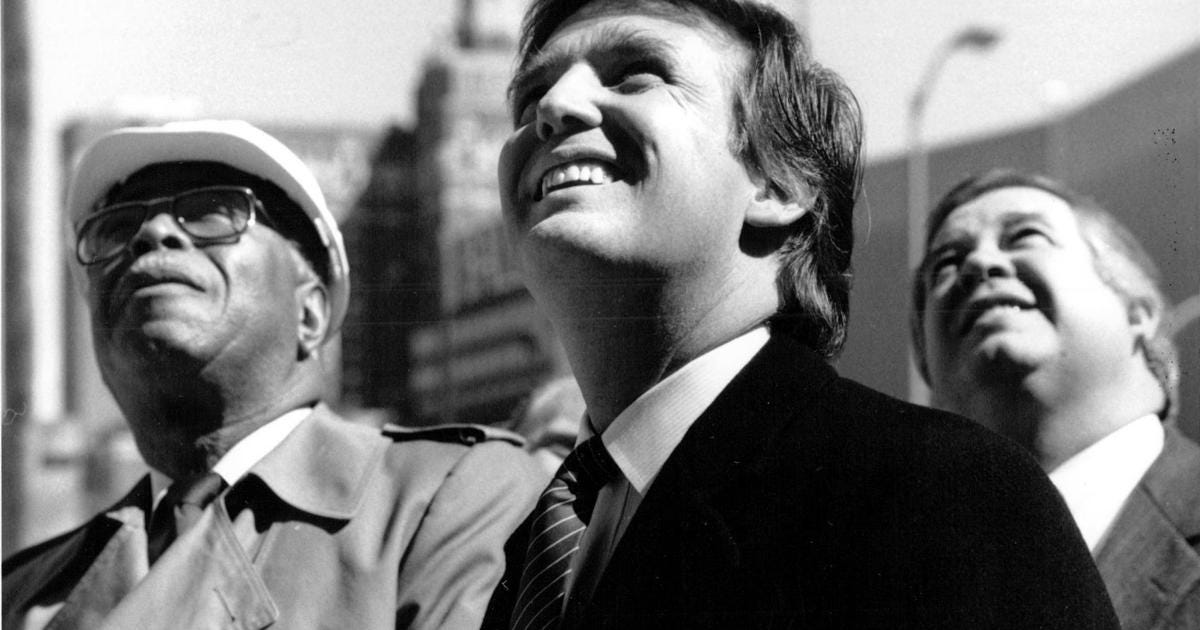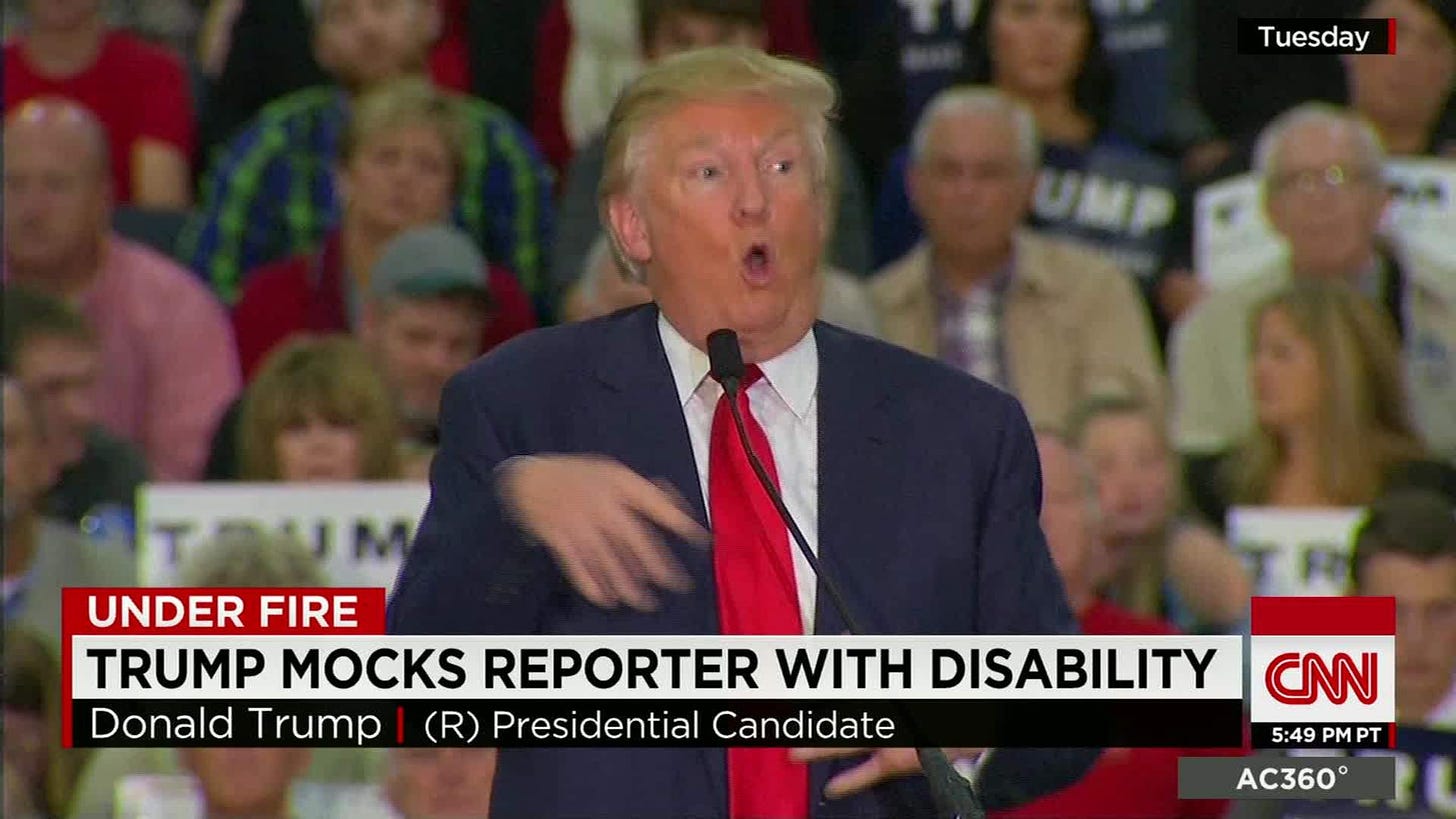With Trump Lying About Helicopter Rides, We Must Remember the Most Despicable Lie He Ever Told—Which Was Also About Helicopters
The sort of man who’d lie about the fiery death of a friend just after it happened—for profit—doesn’t belong in polite society, let alone in office. This report relates, too, to the Butler Incident.

To subscribe to Proof ($6 a month) and gain instant access to its 275+ exclusive articles and reports across twelve sections of content, click the button below. You can cancel at any time.
Introduction
In another sign of his profoundly diminished mental acuity, Donald Trump yesterday confused former San Francisco mayor Willie Brown (who is Black) with ex-California governor Jerry Brown (who is caucasian) just because they have the same last name.
He went on to tell an assemblage of national reporters the story of a hard helicopter landing that he and Willie Brown allegedly experienced that was in fact—it turns out—a helicopter ride that he, Gavin Newsom, and Jerry Brown took in which it was Trump (not, as in Trump’s bizarre made-up story, Willie Brown) who was terrified of a crash landing. Not that there was a crash landing, or hard landing, or even any danger, in the actual helicopter trip at issue.
That part of the story was wholly made up for effect as well.
Many Americans will find it unsettling that Trump would confuse two very different men simply because of their last name; embellish a false story with claims about the cowardice of one of the men he placed into it that were intended to cover up his own legendary physical cowardice—which included dodging the Vietnam draft over faked bone spurs—and then, to add insult to injury, invent out of whole cloth an alleged decades-old conversation between him and Willie Brown about Kamala Harris in which Brown (who has always been fond of Harris) secretly savaged her character.
Except that, again, this supposed helicopter trip never actually happened. And the Trump-Willie Brown conversation never happened. And Willie Brown certainly never expressed fear of a helicopter crash to Donald Trump. And he never, ever spoke with Trump about Kamala Harris. And in the helicopter trip that did happen, it wasn’t a man named “Brown” (as in Jerry Brown) who was a coward, but a man named Trump.
All of which would be bad enough—as it suggests a Republican Party presidential candidate with a badly damaged memory (in the same press conference in which he shared his fantastical helicopter tale, he bizarrely claimed that no one died at the U.S. Capitol on January 6, that Kamala Harris was the first Democratic primary candidate to drop out of the 2020 Democratic primaries when in fact she was the fourteenth, that a court found Joe Biden incompetent to stand trial when nothing even remotely of that character has ever happened, that America has recently experienced “$9[/gallon]” gas, and other delusions) who on top of that is incapable of telling the truth and thus incapable of representing America on the world stage effectively or with any honor.
But it’s so much worse than this. And to realize this, all it takes is looking at Trump’s odd fascination with false tales about crashing helicopters—a fixation that goes back decades.
The Most Despicable Lie Donald Trump Ever Told
As I first reported on at HuffPost eight years ago, multiple reports suggest Trump fabricated a near-death experience following the death of a Mormon executive in his employ—a man who also happened to be a close friend of his—saying to percipient eyewitnesses within mere seconds of learning that his friend had been killed, “I can get some publicity out of this.”
In 2016, in the run-up to the first of two U.S. presidential elections in which Donald Trump lost the popular vote by millions, Michael Kranish and Marc Fisher, both Washington Post reporters, published a biography of Trump, called Trump Revealed, for which the then- and current GOP presidential candidate had supplied twenty hours of face-to-face interviews. In the book, presumably intended by candidate Trump to bolster his then-slumping 2016 bid for the presidency, the businessman detailed for Kranish and Fisher his 1989 reaction to the death by helicopter crash of three Trump-company executives: Mark Etess, Jonathan Benanav and Stephen Hyde, the last of these a Mormon father of seven considered the mastermind of Trump’s Atlantic City casino empire and, at the time of his death, president of the Trump Plaza Hotel and Casino.
According to the New York Times, Mr. Hyde was “an active member of a small local congregation of the Church of Jesus Christ of Latter-day Saints...and commanded the highest respect among religious and business peers.” (At the time of my 2016 reporting on this incident—and still—there was a focus not only on the close Hyde-Trump friendship, or what then seemed a friendship, but also on Hyde’s Mormon faith and ties to Utah, as Trump remains surprisingly unpopular in Utah and each election cycle there, there remains a non-zero chance that he will actually lose the state.)
For years, Trump has insisted that he was slated to be on Hyde’s helicopter the day it crashed—in fact, he told CNN at the time that it was “like a fifty-fifty deal”—and in Kranish and Fisher’s 2016-published biography, he chose to expand significantly on that claim, saying that his phone call to the families of Etess, Benanav, and Hyde after the crash was the equivalent of a military official (or, in a deliberate implication by the then-candidate that he would surely become President of the United States) calling “soldiers’ families when they’re gone.” This claim had the knock-on effect of seeming to position Trump, Hyde, Benanav, and Etess as fellow soldiers; while certainly the three men killed in 1989 were “top” Trump casino executives according to the reports of the time, Trump’s reaction to their death surely confirmed he felt nothing for them.
Whether Trump repeated his claim, in those calls—which he flirts with “stolen valor” in analogizing to calls made by a military official—that he nearly died with Hyde and the others is currently unknown, as no one appears to have asked either Trump or the families themselves what was said on those calls. Indeed there’s been no confirmation that any such calls to grieving families even happened, or that Trump would have ever thought to make such calls.
The problem with Trump’s account, whether or not it was shared privately as well as with numerous national media outlets, is that there’s significant evidence to suggest that it’s false.
As Andrew Kaczynski and Mark Acre of Buzzfeed reported years ago, not just one or two but three biographies of Trump—all citing multiple sources—allege that not only was Trump never slated to be on the helicopter on which Hyde and several others died, he in fact deliberately exploited Hyde’s death as part of a ploy to build publicity and generate profit for himself and his companies.
Per Harry Hurt’s Trump biography Lost Tycoon, after being asked by a reporter, hours after the accident, to comment via telephone on the fatal crash that killed his friend Hyde and several others, Trump muted the line and then said to the several high-level Trump staffers assembled before him, “You’re going to hate me for this, but I just can’t resist. I can get some publicity out of this.” Switching the line back on, Trump issued for the first time a false narrative that he stuck with—indeed was particularly gleeful about exploiting—well into his political career, deploying it as a vile means to convince voters that he’s faced down death and won: “You know, I was going to go with them on that helicopter.”
This claim, and the vague details Trump subsequently appended to it in that interview and into 2016 and beyond, were soon being reported by major news outlets including the New York Daily News, the Philadelphia Inquirer, and UPI. In some cases, unnamed “sources” were quoted for the false proposition that Trump had nearly died alongside Hyde—to be clear, we have no idea if these “sources” to a tale Trump had devised and therefore no one could have corroborated were in fact Trump himself in his bizarre, creepy John Barron alter-ego, or for that matter any of his many other fake identities—while in others Trump himself, under his own name, or sources over which he had control and financial leverage (for instance, then-spokesman Dan Klores) were cited.
The Lost Tycoon cites, according to Buzzfeed, “half a dozen bona fide sources close to Trump” who insist that Trump’s sensational brush-with-death story was and remains “a barefaced lie.”
Not only did Trump travel exclusively, at that time, on his Super Puma helicopter, he also, according to Hurt, had a meeting scheduled for that afternoon which would have precluded him from ever even considering being on the fatal flight Hyde and the others took.
A similar—and similarly well-sourced—debunking of Trump’s claim can be found in Wayne Barrett’s The Deals And The Downfall, and then again, in some detail, in John R. O’Donnell’s Trumped! Even an Associated Press story that ran at the time quoted Bernie Dillion, a vice president of Trump Sports and Entertainment, as saying that “Trump had definitely never planned to be on [Hyde’s helicopter].”
Why It Matters
In 2024, Trump remains so unpopular in Utah that a Zogby Poll taken this past spring shows that in a head-to-head matchup even Robert F. Kennedy Jr.—who shows the effects of brainworm damage—would beat him (and for that matter Biden) in the state.
While no Trump-Harris poll has yet been taken in Utah, it’s worth noting that, per a Pew Research study, 5% of all U.S. Mormons live in the purple state of Nevada and 4% live in the purple state of Arizona, with 35% residing in Utah. While needless to say every American should be disgusted by Trump’s betrayal of his deceased friend—and several other top employees—for personal profit, given that Hyde was so respected in his Mormon community it might be thought this shocking tale would strike Mormons (who already support Donald Trump far less enthusiastically than many other groups, a serious political problem for Trump that is allegedly getting even worse) particularly hard.
And beyond Nevada, Arizona, and Utah, 7% of Mormons live in the Midwest—home to battleground states Wisconsin and Michigan.
Just as independent politician (and Mormon) Evan McMullin gave Trump a shocking run for his money in Utah in 2016—garnering 22% of the vote, with Hillary Clinton getting another 27%, for a combined nearly half of the votes in Utah—it could well be imagined that in 2024 the popularity of a Nebraska-born candidate like Tim Walz, coupled with the possible presence of a “wild card” like Kennedy, could cause Trump grief in Utah in a national race for president that is predicted to be incredibly close. It must be remembered that Hyde was, in addition to a highly regarded member of the sizable Mormon community in Utah, Mr. Trump’s top Mormon employee at the time; does the ease with which he desecrated the memory of his friend speak to how little regard he really has for religious persons? That, to be sure, is a very well-documented phenomenon (see, e.g., 1, 2, 3, 4, 5, 6, and 7).
As recently as 2015, the Trump Organization—since revealed to be a business that runs on civil and even criminal Fraud (see, e.g., 1, 2, 3, 4, 5, 6, and 7)—has refused to comment on the now-widespread allegations that Trump lied about the death of Mr. Hyde to use that death for profit and publicity. And major media has done Trump the good turn of never asking him about it from 2017 onward, even as his penchant for lying about matters of life-and-death became startlingly clear during his time in office and came to the forefront again after The Butler Incident, which occurred just weeks ago.
Conclusion
Indeed, things have now changed for Trump significantly, and in ways that make his 1989 lies about a helicopter crash relevant again. And it’s not just because he’s once more lying about helicopter rides—though he clearly is.
In fact, the more specific question of whether Trump would lie about almost dying has been put at the forefront of the 2024 U.S. presidential campaign—by Trump himself, who swore at the Republican National Convention in Milwaukee last month that he would never again discuss what’s widely been described as an attempted assassination of him in Butler, Pennsylvania, but who’s since not only made the event a centerpiece of his bid to regain political power in America but also ruthlessly lied about it and framed his supposedly miraculous survival as additional evidence he’s God’s “Chosen One”—a wildly blasphemous self-designation as a religious figure and martyr that again puts his treatment of a devout employee and friend in 1989 squarely on the table.
We know Trump has contempt for religious people (see above). We know he is the most prolific pathological liar in American political history. We know he sees lying about near-death experiences as an opportunity for personal gain and falsely framing himself as religious—and as someone who respects organized religion—when he’s not.
We also know that he’s in significant mental decline, as evidenced by the genuinely hard-to-watch hour-long press conference he gave yesterday that is now being near-universally panned as spectacularly incoherent, intemperate, rambling, and lie-filled.
It used to be the case that Americans judged people by their words: a man who would make up a decades-old conversation that never happened, during an event that never happened, to attack a political rival whose existence he wasn’t even aware of decades ago, is not a man who can be trusted as to anything he says about supposed friends (as he falsely described Willie Brown as being, and as he certainly pretended, up until the latter’s death, Stephen Hyde was) or political rivals (whether Kamala Harris or, for that matter, Clinton, as his lies about her were clearly part of his first impeachment even as his lies about Joe Biden were associated with a second impeachment). These days it seems as though “vibe” matters more than “facts,” and many who support Trump do so because they like his vibes and just ignore the absent truth-quotient of everything he says.
What we should be asking these Trump voters, and Trump-curious voters, is how they would react if Trump raped their daughters as he raped E. Jean Carroll. How they would react if he called their dead brothers or sons who served in the U.S. military “losers and suckers”, as he provably did all U.S. veterans. Or how would they feel if Trump had pretended to be friends with their father or uncle only to try to profit off his violent death hours after it happened. It should not take asking voters with little empathy to try to pretend they have any to get them to understand why acts of this sort are contemptible, but perhaps that’s what’s required. Perhaps Mormon voters in the Southwest and Midwest will see themselves in Stephen Hyde, even if they do not see themselves in the dead soldiers Trump mocks or the non-Mormon evangelicals Trump mocks or the persons with disabilities we now know Trump feels should be killed indiscriminately.
This last point is particularly salient. We thought, once, that Trump would do no more than engage in vile public mocking of persons with disabilities, but now we know he wants such people dead—and indeed refuses to be pictured alongside anyone disabled in war because it disgusts him and makes him (he thinks) look weak. (Nevertheless, such photographs have on occasion happened anyway, against Trump’s wishes and to his great private anger with his political aides.)
All this points to a maxim many of us who write about Trump are well aware of: with Trump, there is no bottom. Matters are always worse than you first believe they are.
Just so, a pairing as esoteric as Trump and helicopters. You might have thought that Trump would only lie about who he was in a helicopter with and when he was with them in a helicopter and what was discussed in that helicopter and who that was in that helicopter was or was not afraid of it crashing, but of course it’s much worse than that: when Trump learns people close to him have burned to death in a helicopter crash, he immediately begins rubbing his thumb and forefinger together while trying to figure out how to make money off it. And a man like that has no place in a human civilization whatsoever.
Coda
Incredibly, Donald Trump did not stop abusing the memory of Hyde and the other dead Trump casino executives after initially exploiting their deaths for publicity.
As PBS reports—and it’s almost hard to believe any man, of any background, could be this thoroughly vile—after “a helicopter crash in 1989 killed two [Trump] casino executives, [b]usiness soon soured for Trump in Atlantic City. [Former Trump Plaza Casino Vice President Jack O’Donnell] says Trump began ‘blaming these problems on two people that had died while working for him [in 1989].’”
That’s right: Trump further dishonored the dead by using them as a rhetorical foil to hide that, simply by the numbers, he was—all on his own—the least successful U.S. businessman from 1985 to 1994.









Thank you for informing us of the 1989 helicopter incident. He’s beyond disgusting and evil. Let’s vote blue and make sure he never gets close to the White House ever again.
The fact that the “presser” is now being near-universally panned as spectacularly incoherent, intemperate, rambling, and lie-filled” is borderline miraculous (although Fox is saying that it was flawless). As you noted, all of this information has been available to the media from the moment Trump stepped on the stage. As you also noted, it is so much worse than the lies he spewed at his media gaggle. IMHO as a sane but non-medical observer, DJT is not sane and probably has never been. He is and has been a deranged, narcissistic sociopath for at least his adult life. Just as he has always been a racist and a misogynist. I admit that there were times early on when he didn't come off as completely unhinged, but he was never playing with a full deck. And the Captain Queeg moments are pretty much the norm now. You would not need to be diving into to the batshit crazy helicopter story if we had a real press doing the job that a real press is supposed to do. If Trump is ever carted off to an institution for mental health treatment, as he should be, I'm sure the press will interview him there - and probably use the Mr. President salutation. If we keep our democracy and the history of this period is documented, the failure of the press will be among the most shameful aspects. Anyway, thanks for continuing to commit real journalism. You and other alternative media outlets may finally be breaking through.